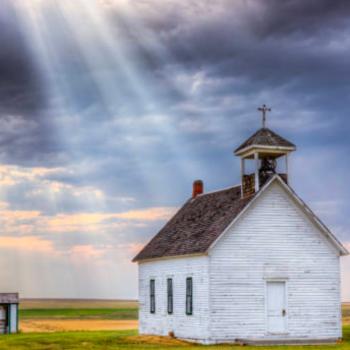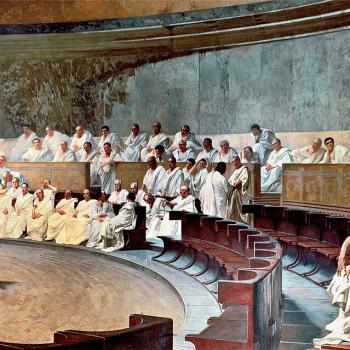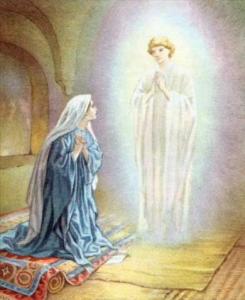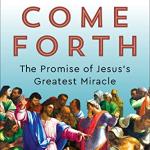
The Bible presents men with an encyclopaedia of role models to be inspired by. The roll call of faith in Hebrews 11 showcases the faith of 14 men (not counting ‘the prophets’) but only 3 women, one of whom is unnamed in the text (Moses’ parents are commended as a unit rather than as individuals), another was a prostitute, and the third, Abraham’s wife Sarah, is briefly referred to in long paragraphs about her husband. Ironically, the reference is only moderately praiseworthy:
‘And by faith even Sarah, who was past childbearing age, was enabled to bear children because she considered him faithful who had made the promise.’
In essence, that part of the chapter reads Abraham, Abraham, Abraham…even Sarah…Abraham, Abraham, Abraham.
Even Sarah. I can’t help feeling that this is a fair summary of how women are seen in broad swathes of the Church.
We need to recognise that the Bible was written by men, and mostly about men. This isn’t necessarily a problem if we recognise the cultural reasons for this and the dominance of patriarchy throughout human history, but if we’re tied to literal readings of the Bible, the holy scriptures become a tool of oppression against 50% of the human race. If only we gave ourselves permission to switch our brains on instead of cling to the false doctrine of inerrancy!
Considering the Biblical texts, how many female role models can women draw inspiration from? And by role models, I mean women who are the main characters in their stories, and whose faith is the principal example on display. The list is fairly short – Ruth, Esther, Deborah, Mary Magdalene, and Mary the Mother of Jesus. There are no doubt others such as Anna the prophetess, briefly mentioned in the course of a narrative, but how often are women at the heart of a story of faith, rather than referenced in the context of their relationship to men?
Anna the prophetess is a good example of the differing treatment of men and women in the Biblical narrative. In Luke 1, the new-born Jesus is received and announced as the saviour of the world by two prophets, Simeon and Anna. This is how Simeon is introduced in Luke 2:25,
Now there was a man in Jerusalem called Simeon, who was righteous and devout.
Compare this to Anna’s introduction in verses 36-37:
There was also a prophet, Anna, the daughter of Penuel, of the tribe of Asher. She was very old; she had lived with her husband seven years after her marriage, and then was a widow until she was eighty-four.
She is not praised for her qualities as Simeon was, and is referred to as a wife, a daughter, and a widow.
Here’s how Simeon’s response to Jesus is recorded (verses 26-34):
It had been revealed to him by the Holy Spirit that he would not die before he had seen the Lord’s Messiah. Moved by the Spirit, he went into the temple courts. When the parents brought in the child Jesus to do for him what the custom of the Law required, Simeon took him in his arms and praised God, saying:
“Sovereign Lord, as you have promised,
you may now dismiss your servant in peace.
For my eyes have seen your salvation,
which you have prepared in the sight of all nations:
a light for revelation to the Gentiles,
and the glory of your people Israel.”
The child’s father and mother marvelled at what was said about him. Then Simeon blessed them and said to Mary, his mother: “This child is destined to cause the falling and rising of many in Israel, and to be a sign that will be spoken against, so that the thoughts of many hearts will be revealed. And a sword will pierce your own soul too.”
And here is the record of Anna the prophetess’s response in verses 37b-38:
She never left the temple but worshiped night and day, fasting and praying. Coming up to them at that very moment, she gave thanks to God and spoke about the child to all who were looking forward to the redemption of Jerusalem.
I think we need to acknowledge that the Bible is a male-centric book. If we want to respect and love women, we ought to don an extra lens when reading it that allows us to broaden its application.
We have a problem
I greatly empathise with women in the Church. In recent years, I was a committed member of a Pentecostal church in my local area. There were many wonderful things about this congregation and both pastors were gentle and kind men, but even in this context, women were very much second class citizens – wives and daughters rather than a force to be reckoned with on their own terms. In the four years I attended, I only remember a single sermon delivered by a woman, and she was the wife of the principal worship leader. There were plenty of lovely women around but they were very much in the ‘even Sarah’ mould, serving their husbands, families, and communities in the background and never given much of a voice.
Don’t get me wrong, this was a good church, and far more progressive than many others in its denomination, but the overarching patriarchy of the Bible, if left unchallenged, places a glass ceiling over the heads of all women, no matter their gifts. Good pastors all over the world are keeping the women in their congregations in a box out of a sense of obligation to a patriarchal text. We need to adjust our understanding of the Bible and how to apply and interpret it in the modern day. It was never meant to be a permanent cultural manual, and yet we mistakenly enforce a 2100 year-old culture on women who are given much greater respect beyond the doors of the church. If we don’t fix this, the Church is done for.
A New Apocryphal Text
Given the dearth of female role models in the Bible, I think it would be healthy to redress the imbalance. I’d love to see a formal text, collating examples of women whose walk of faith has been a tremendous example to both men and women. No doubt there are many publications that touch on this subject, but I’m thinking of a huge body of work that can be referred to by chapter and verse.
Please note, I’m not suggesting an addition to the Canon of Scripture, but a text so thorough and alive with stories of faith that it becomes a beloved, trusted resource. Am I dreaming here? Is this something we can do? Or do we have to stick with the very short list of female heroes in the Bible? When our daughters are looking for direction, do they have to become either Esther, Sarah, Hannah, or Deborah? When modern day women of faith pursue their destinies, what can we do to encourage and liberate them?
Who would you include in a modern day text about women of faith? I’m keen to hear from women on this topic, though of course men are also welcome to comment.

















